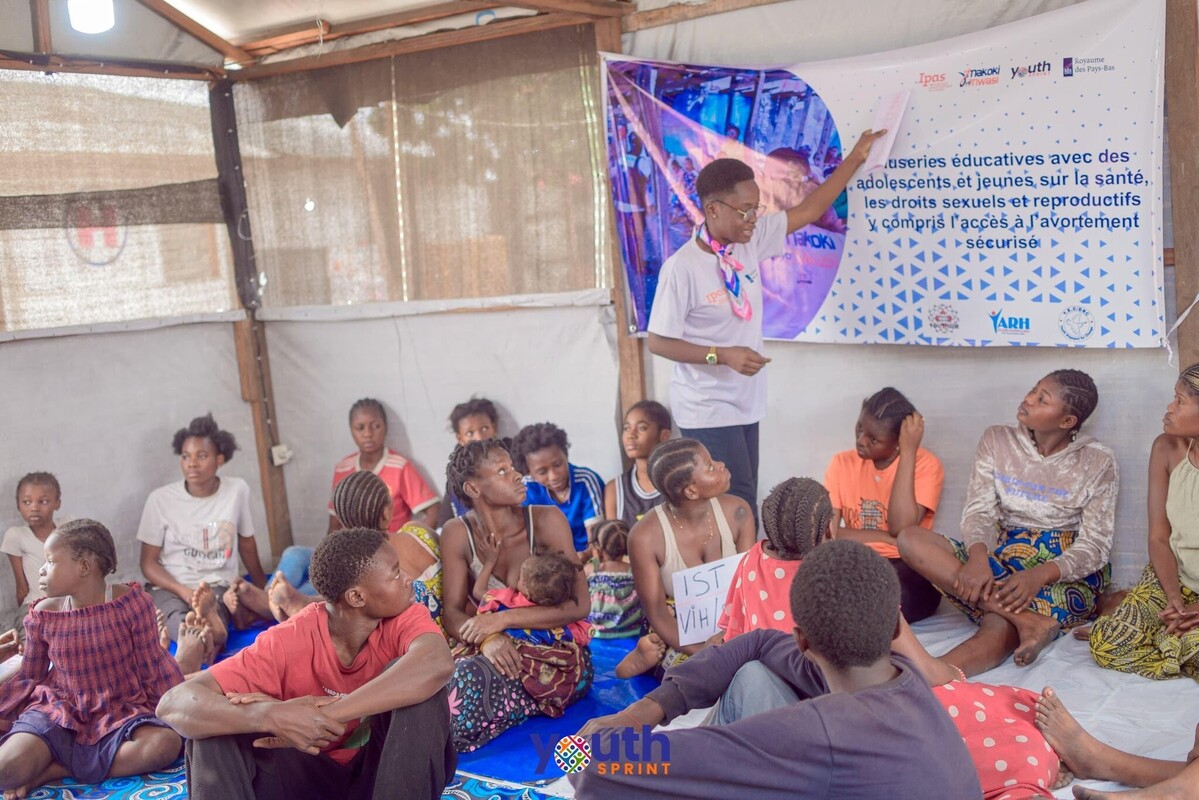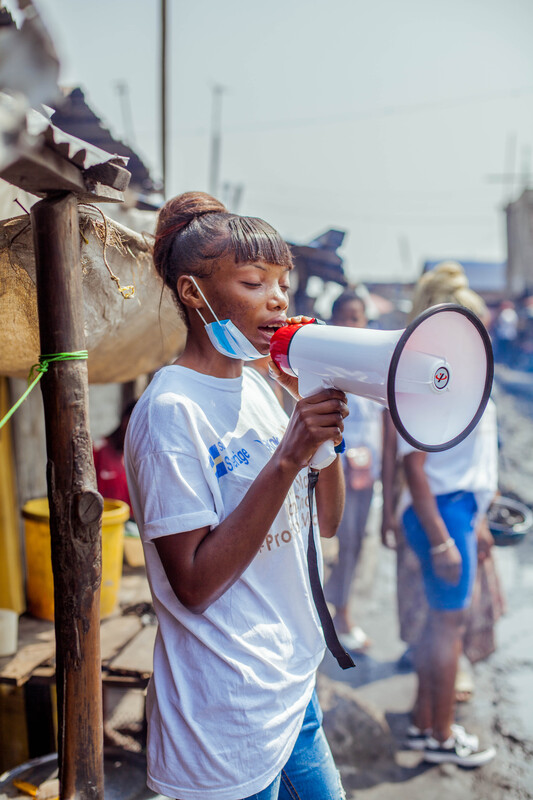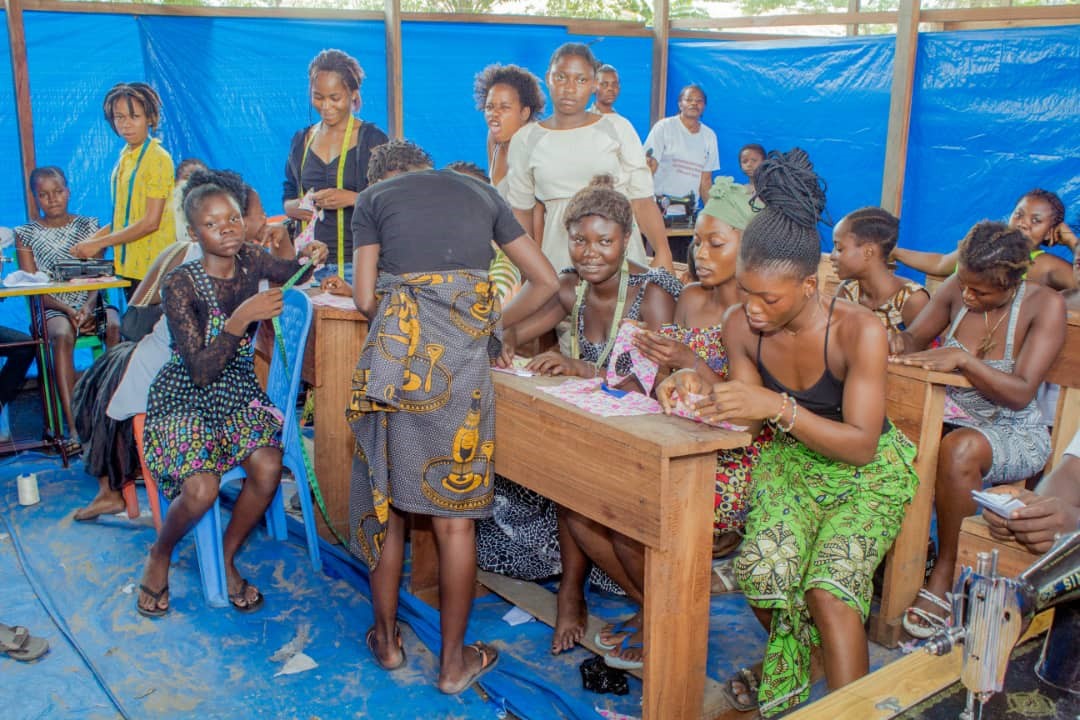In the Democratic Republic of Congo, the Pakadjuma neighborhood in Kinshasa’s Limete commune is known for its poor conditions, and a high prevalence of prostitution, criminality, rape and other forms of violence. Beneath this harsh reality, the area is home to young girls and women looking for better livelihoods and opportunities. Many end up facing unwanted pregnancies as they turn to the sex trade as their only option to survive in this difficult environment.
Header image: Peer educators on a motorcycle in Pakadjuma during the 16 days of activism awareness campaign in 2021.

Melchie Ibula, member of the Youth Sprint Network during a community dialogue with sex workers in Pakadjuma for the International Day of Sexual Health.
A center in the midst of needs
Amidst social inequalities, high illiteracy rates and a substantial number of teenage mothers, the local organization “Cadre de Récupération et d’Encadrement pour l’Epanouissement Intégral des Jeunes” (known as Creeij), whose mission is to empower young people through training, capacity-building and apprenticeships for unemployed and out-of-school girls, launched its work in the Pakadjuma neighborhood in 2017.
Creeij set up a training center called “Center la Grace” to provide vocational training and literacy courses—but above all to promote bodily autonomy and sexual and reproductive health rights by providing women and girls with reliable information on sexual health and family planning.
Despite the progress achieved so far, however, these women and girls still face many issues, among them rape and unwanted pregnancies that lead to unsafe abortions. As Falonne Mayoke, director of the Centre la Grâce and Creeij’s program manager, explains, “It’s one thing to provide women and girl mothers with literacy and vocational training, but their challenges remain the same after the training: finding the money to feed their families, pay the rent and so on. The consequences are rape or unwanted pregnancy.”
That is why Ipas DRC has been supporting Creeij since 2019 in its efforts to improve the community’s knowledge of the Maputo Protocol and the protocol’s provisions for sexual and reproductive health information and services, including safe abortion.

Raising awareness for better outreach
Creeij works with peer educators to help women and girls by providing them with information on sexual health and explaining the provisions of the Maputo Protocol, which authorizes safe abortion under certain conditions.
These community change agents act as a bridge between the community and the Pakadjuma health facility, which provides sexual and reproductive health care, including abortion. The Centre la Grace registers the needs of young girls, and the peer educators in Creeij then accompany the young women to a health clinic supported by Ipas DRC.
These peer educators are essential, as the below story of Maisha, a 22-year-old sex worker since the age of 12, clearly shows.
At left: Peer educator in Pakadjuma during the 16 days of activism awareness campaign in 2021.
‘Today I am alive.’
After the loss of both her mother and father, Maisha began working as a sex worker to support herself and pay for her studies. “A few months ago, I became pregnant, and my friends advised me to have an abortion,” Maisha says. “Unfortunately, the abortion went wrong, and I started bleeding for days. At the time I was already a member of the center but was too ashamed to tell them what was going on after what I had done. One day, I was at home, and I heard the peer educators on the street talking about where to have a safe abortion and how high-quality abortion care could save lives. As they were talking, they mentioned that ‘Centre la Grace’ could refer to any abortion cases. I went there and, luckily, they brought me to the clinic. Today I am alive.”
Indeed, Maisha is a healthier woman who is now taking a sewing course, has ceased sex work, and is hoping to buy a sewing machine very soon after her training, so that she can turn it into a profession.
A fight that is no longer a fight
Over the past five years, Creeij has been able to meet a long-neglected need in this community, where women’s decision-making power is scorned. In addition to awareness-raising and referrals, the project has enabled Creeij to address the issue of safe abortion for women and girls who, despite vocational training and the yearning to change their lives, had little choice but to become sex workers. Thanks to the vocational training at Creeij, these women can now make their own decisions about their profession and can choose whether or not to carry unwanted pregnancies.

Women and girls in Pakadjuma during sewing courses provided by Creeij local organization supported by Ipas DRC.


